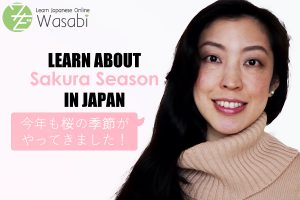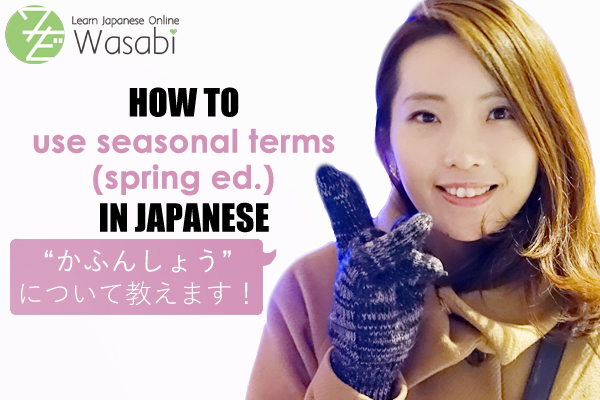Seasonal Terms (Spring Ed.) in Japanese
Welcome back to another “Video & Article” series, this time for another live-stream with tutor Erika. This live-stream is about seasonal terms used in Japanese and we are introducing some spring related terms, including vocabulary regarding the wide-spread hay fever here in Japan.
| Table of Contents [General Terms] [Hay fever in Japan] |
[General Terms]
Japan is often visited by spring storms, which can be as strong as Typhoons and paralyze parts of the public transportation system. These spring storms are called “春の嵐”.
春
Spring
の
Possessive particle
嵐
Storm
An example sentence could look like this:
先週は春の嵐が日本列島を横断しました。
A spring storm crossed over the Japanese islands last week.
The feeling when the temperatures are beginning to rise, and you slowly start to feel spring in the air is called “春の陽気” in Japanese.
春
Spring
の
Possessive particle
陽気
Season, weather, merriness, cheerfulness
“陽気” means weather in this case, but you can see how the other meanings of this word would give it a very positive note. When the weather is starting to get nice and warm in April and May, Japanese people will say “春の陽気だね/ですね”.
An example sentence with this expression could look like this:
ようやくだんだん暖かくなってきて春の陽気を感じることができます。
It’s finally becoming warmer and warmer, and it feels like spring is in the air.
Another expression you may here in spring is “ポカポカする”. “Pokapoka” is one of the many onomatopoeia (オノマトペア) (words that imitate or suggest the source of the sound they describe). “ポカポカする” means that something feels warm. It can be used to describe warm spring weather, but also many other things!
For example, after a nice, long bath you could say:
お風呂の後で体がぽかぽかする
I feel nice and warm after taking a bath.
いい天気でぽかぽかするね。
The weather is so warm and pleasant.
[adsense]
[Hay fever in Japan]
While spring is a generally warm and beautiful season in Japan, there that afflicts about 20% of the Japanese population: hay fever. Pollen are “花粉” in Japanese, and hay fever is “花粉症” (“症” means illness, hence literally this would be “pollen illness”).
Hay fever in Japan is mostly caused by the pillen of two local tree species: 杉 (Japanese cedar) and 桧 (Japanese cypress).
Similar to the cherry blossom season, pollen season is tracked across television and news outlets as it progresses from south to north across the country. Pollen season starts with rising temperatures, so around mid-January to February with its peak in March and early April.
During this season, you cannot only see many people wearing masks around the city, but also lots of advertisements and TV commercials for anti-pollen medicine and remedies.
Let’s learn a few phrases you will hear a lot during hay fever season (or if you are unlucky, may need to use yourself).
わたしは花粉症です。鼻水がでて目がかゆいです。
I have hay fever. My nose is running and my eyes are itchy.
くしゃみが止まらないです。
I can’t stop sneezing.
のどがいがいがします。
Something is irritating my throat.
This is a conversation that could easily take place during hay fever season:
マスクしているけどかぜひいたの?
Are you wearing a mask because you caught a cold?
ううん、花粉症なんだ。
No, I have hay fever.
スギ花粉?
Is it cedar pollen?
うん、鼻水がでて辛いよ…
Yeah, my nose is running so much…
If you’re worried about pollen season in Japan, don’t be! (Okay, maybe be a little worried.) There are high-quality masks you can buy all over in drug stores or convenience stores that can help you ward off the worst.
That’s it for today. If you have any questions, you can always clear them up by booking a lesson with one of our native Japanese tutors. See you next time!
| 春 | Spring |
| 嵐 | Storm |
| 日本列島 | Japanese islands |
| 横断する | To cross, to traverse |
| ようやく | Finally, at last |
| 暖かい | Warm, mild (for weather) |
| 陽気 | Season, weather, merriness, cheerfulness |
| 感じる | To feel |
| ポカポカする | To be warm and pleasant, to be nice and warm (onomatopoeic word) |
| お風呂 | Bath |
| 花粉 | Pollen |
| 花粉症 | Hay fever |
| 杉 | Sugi, Japanese cedar |
| 桧 | Hinoki, Japanese cypress |
| 鼻水 | Dripping nose, snot |
| かゆい | Itchy |
| くしゃみ | Sneeze |
| いがいがする | To tickle (in the throat) (onomatopoeic word) |

All options for “I” and “You” in Japanese explained

How to talk about Sakura (Cherry Blossom) Season in Japanese



